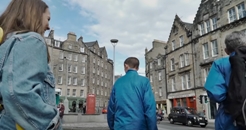 Alternative Walking Tours - Invisible Cities
Alternative Walking Tours - Invisible Cities
From an article by Reasons to be Cheerful
After struggling with alcohol addiction for over 10 years — during which his 20-year banking career and 30-year marriage both collapsed — it was a presentation in a rehab centre in 2019 that became the catalyst for Miles to turn his life around.
The presentation was by Invisible Cities, a social enterprise which, since its inception in 2016, has trained 118 formerly homeless people to become tour guides. It’s a creative way of giving them not only a new income stream, but also a new sense of purpose — and skillset, too.
It took Miles six months to put together his tour of York. “I probably wouldn’t be where I am today without the opportunity Invisible Cities gave me. I’ll always be grateful for that.”
Invisible Cities’ guides specialize in unique topics that reflect their own personal story — such as a city’s notable women, protest culture, ties to witchcraft or how crime and punishment has evolved — in the UK cities of Edinburgh, York, Cardiff, Glasgow and Manchester.
Invisible Cities provides training for guides to create these “alternative walking tours,” as well as in public speaking and customer service skills. The organization is then responsible for marketing the tours and taking bookings. Participants pay and this is split between the guide and Invisible Cities. Invisible Cities has also set up a grant program for guides to access funding to do other external courses or start their own business, and offers training in IT and presentation skills to help them gain further employment.
On his tours, Miles focuses on health and wealth in York, in parallel with his own experience in which his health was compromised due to addiction, and both having and losing wealth. He highlights buildings that have brought either health or wealth to the area e.g. one of the first hospitals in the UK, Terry’s Chocolate factory and Rowntree's.
His tours have evolved over the past five years based on social developments in the city and the questions participants ask. For example, his tours have addressed issues such as gang-related drug dealing, and a lack of accessible parking in the city, and he also weaves in his own experience living with addiction.
Universities in the area have made his tour part of the curriculum for social policy students. Doctors have come along who say they’ve got more out of it, in terms of understanding the city’s social support structure for homelessness and addiction, than a formal training day.
Invisible Cities' founder Zakia Moulaoui Guery initially came up with the idea to help formerly homeless people gain the confidence to embrace the next chapter of their lives. To spread the concept of Invisible Cities further across the country, Moulaoui Guery has since developed a social franchise model, partnering with existing homeless organizations, which then take on the recruiting and training of guides. In this way, expansion to other areas are currently in the works.
Not all who take on Invisible Cities’ training become guides. About a quarter of a training cohort of around eight people become guides, while another quarter stay involved with Invisible Cities in a different capacity. Another quarter take up a different opportunity, through a job or setting up their own venture. And another quarter move on without staying in touch.
Miles, meanwhile, is not only sober and in his own apartment, but has also helped set up another non-profit organization to tackle homelessness and poverty.
Watch this 4 minute video:
Read the full article here.
Retweet about this article:
From an article by Reasons to be Cheerful, 19/06/2024